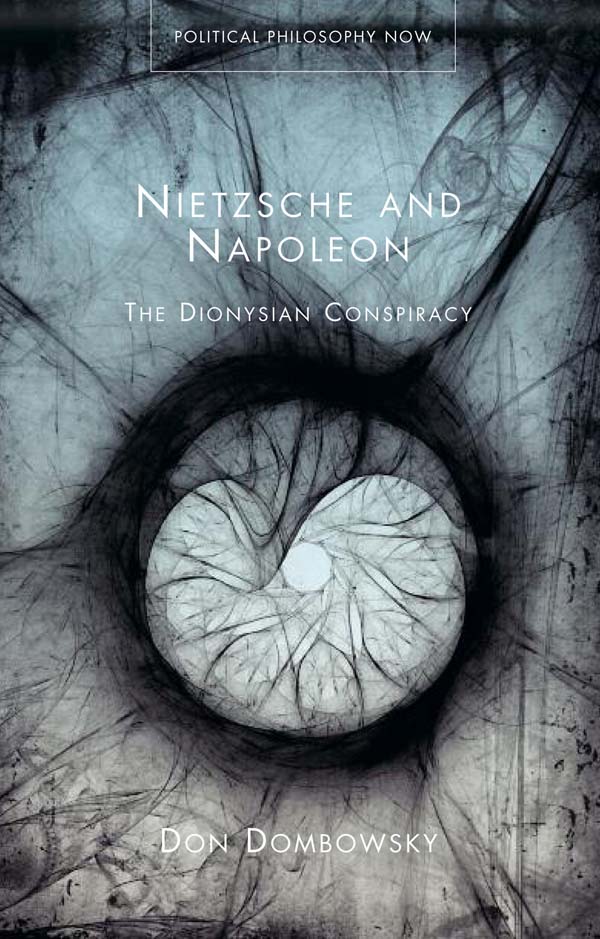Nietzsche and Napoleon
The Dionysian Conspiracy
Author(s) Don Dombowsky
Language: English
Genre(s): History
Series: Political Philosophy Now
- September 2014 · 240 pages ·216x138mm
- · Hardback - 9781783160969
- · eBook - pdf - 9781783160976
- · eBook - epub - 9781783160983
This book argues that Nietzsche's political thought and his own proposed model of governance is Bonapartist in conception: autocratic will in the guise of popular rule. Bonaparte is the model for the Nietzschean commander; not only his virtu, his ethics of martial valour, but his political institutions and techniques of power. Nietzsche understood that Napoleon manipulated the democratic process, abandoned the concept of popular sovereignty and undermined the principle of equality, that he was opposed to parliamentary politics but maintained their simulacra, a manoeuvre Nietzsche admired in respect of tactics. Nietzsche desired a revaluation of all values which endorsed many features of the Bonapartist regime. One can see Nietzsche not merely situated in the Napoleonic historiography of the cult of personality, but also situated ideologically in terms of a Napoleonic political policy and theory of government, in so far as he affirms certain political structures of the Napoleonic Empire. Nietzsche moves beyond the Napoleonic cult of personality to an analysis of the underlying structures of the Napoleonic empire. Nietzsche admires the 'artist of government' Napoleon (Napoleonic Caesarism) not only for his force of will but also for his political policies and tactics or political techniques.
Contents
Introduction: The Dionysian Conspiracy
1. Sources, Cults and Criticism: Nietzsche’s Portrait of Napoleon
1.) In the Gilded Orbit of the ‘Ideal Artists’
2.) Nietzsche’s Napoleon: Against Thomas Carlyle’s Cult of the Hero
3.) Nietzsche’s Napoleon: A Polemic
4.) The Artist of Government
2. Aristocratic Radicalism as a Species of Bonapartism
1.) From Character-type to Structure
2.) Nietzsche’s Understanding of Bonapartism
3.) Nietzsche and the Underlying Structures of the Bonapartist Empire (1799–1815)
4.) Aristocratic Radicalism
3. Napoleon III: ‘déshonneur’
1.) Caesarism
2.) Nietzsche and the Underlying Structures of the Second Empire (1851–1870)
3.) Nietzsche’s Rejection of Napoleon III
4.) Nietzsche’s Immanent Critique of Bonapartism
5.) Nietzsche’s Radical Bonapartist Alliance
Conclusion: The Imperial European Future
Introduction: The Dionysian Conspiracy
1. Sources, Cults and Criticism: Nietzsche’s Portrait of Napoleon
1. In the Gilded Orbit of the ‘Ideal Artists’
2. Nietzsche’s Napoleon: Against Thomas Carlyle’s Cult of the Hero
3. Nietzsche’s Napoleon: A Polemic
4. The Artist of Government
2. Aristocratic Radicalism as a Species of Bonapartism
1. From Character-type to Structure
2. Nietzsche’s Understanding of Bonapartism
3. Nietzsche and the Underlying Structures of the Bonapartist Empire (1799–1815)
4. Aristocratic Radicalism
3. Napoleon III: ‘déshonneur’
1. Caesarism
2. Nietzsche and the Underlying Structures of the Second Empire (1851–1870)
3. Nietzsche’s Rejection of Napoleon III
4. Nietzsche’s Immanent Critique of Bonapartism
5. Nietzsche’s Radical Bonapartist Alliance
Conclusion: The Imperial European Future


